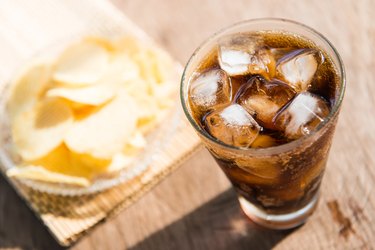
If you develop upper right abdominal pain after drinking soda, you need to talk with your doctor about your symptoms so he can diagnose the cause. This pain is most likely not a sign of a serious medical condition. Common effects of consuming carbonated beverages are gas pains and heartburn, each of which can cause upper right abdominal pain. If you develop upper right abdominal pain often, you may have irritable bowel syndrome, a more serious digestive condition.
Gas Pains
Video of the Day
Gas pains can develop at any moment, causing sharp pains throughout the abdomen that can be embarrassing. The formation of gas during digestion is a normal occurrence that leads to belching and passing gas. MayoClinic.com states that most people pass gas about 10 times daily, but if some of the gas becomes trapped in the digestive tract, you can develop pain form excessive pressure. Due to carbonation, soda beverages contain air bubbles that can add to the amount of trapped air in your digestive tract, increasing your chances of gas pains. The pain in your upper right abdomen should subside once you pass gas or have a bowel movement.
Video of the Day
Heartburn
Heartburn is a common cause for upper right abdominal pain. Heartburn is a burning feeling that occurs in your chest after eating or drinking. The sensation is the result of stomach acids entering the esophagus because of a sphincter muscle malfunction. Certain foods and beverages can increase your chances of developing heartburn, such as carbonated beverages, coffee, caffeine, alcohol, citrus fruits, tomato products, fatty foods, spicy foods, onions and garlic, according to FamilyDoctor.org. If you expereince heartburn more than twice a week, you need to talk to your doctor about gastroesophageal reflux disease, a condition often referred to as GERD.
Irritable Bowel Syndrome
Irritable bowel syndrome can cause upper right abdominal pain after consuming soda. IBS is a common digestive condition that affects about one in five Americans. It is primarily related to irregular movements in the colon that cause chronic constipation or diarrhea. If you've been diagnosed with IBS and you notice that drinking soda triggers your IBS symptoms, remove soda products and other carbonated beverages from your diet. Soda may affect you and may not affect someone else with IBS.
Considerations
You may have other digestive conditions that are triggering your symptoms, such as gallbladder disease or pancreatitis. Talk with your doctor about your symptoms and the most effective treatment options.
Is this an emergency? If you are experiencing serious medical symptoms, please see the National Library of Medicine’s list of signs you need emergency medical attention or call 911.